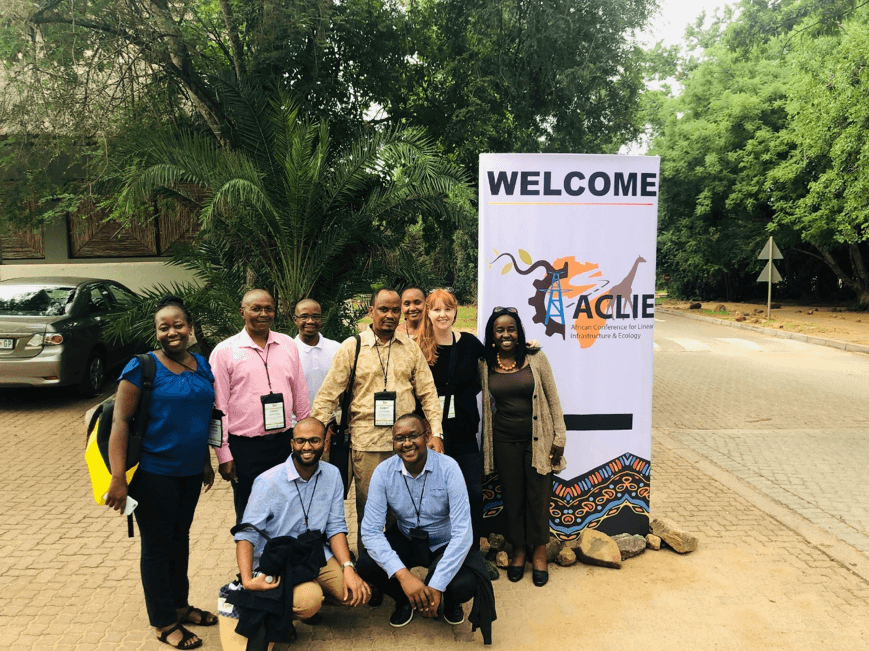Sarah Chiles and Toby Otieno have just arrived to South Africa’s Kruger National Park, one of the largest reserves in Africa, but they are not here to monitor the Parks’ world famous populations of lions, leopards, rhinos, elephants, or giraffes. Instead, Sarah is here to discuss the impact that human development is having on protected areas, just like Kruger, across the African continent. For five days, over 130 delegates from 15 countries will gather in the National Park for the first ever African Conference for Linear Infrastructure and Ecology (ACLIE). After three years of planning, ACLIE was established to adopt meaningful partnerships between two unlikely collaborators in Africa: advocates for wildlife conservation and organizations working on infrastructure development.
For many years, individuals working in environmental conservation and infrastructure development organizations have battled against each other: one side pushing for the creation of highways, railways, electric power lines and economic gains, while the other has fought for the protection of natural landscapes and wildlife habitats. But here at ACLIE, the two are coming together, in hopes of learning from one another, to avoid the same mistakes that have been made in other parts of the world when rapid economic development took place. For you Game of Thrones fans, it’s kind of like when Daenerys joins Jon Snow in his fight against the Night King. She does so because she understands that it’s more important to work together to ensure the existence of the Seven Kingdoms than to continue quarreling over who gets to rule it.
More than half of global population growth between now and 2050 is expected to occur in Africa. Roads, railways, power lines, and other linear infrastructure are essential aspects of modern human societies, and thus will be necessary to accommodate Africa’s growing population. However, this infrastructure can have detrimental impacts on species, communities, and ecosystems, including human and wildlife conflict, and the loss or degradation of habitat. With this in mind, Sarah and Toby joined ACLIE to make biodiversity a mainstream topic with energy, mining, and infrastructure stakeholders, to maximize the ecological, economic, and social outcomes of any future developments without harming wildlife populations. In addition to presentations on policy, legislation and research, practical examples were showcased with regards to engineering underpasses and overpasses for maintaining ecosystem connectivity.
Sarah works collectively for two WCN partners based in northern Kenya, Grevy’s Zebra Trust and Ewaso Lions, as their joint Landscape Infrastructure Advisor. Toby works alongside Sarah as Ewaso Lions’ Research Manager. Beyond building their own knowledge, Sarah and Toby used ACLIE to advance the expertise of Kenya’s infrastructure decision makers on the ecological impacts of their work. Thanks to support from WCN, senior officials from the Kenya Highways Authority, Kenya Railways Corporation, LAPSSET Corridor Development Authority, and the Kenya Electricity Transmission Company also attended the conference. Sarah presented to the group on the lessons learned from mitigating the environmental impacts of the Lamu Port-South Sudan-Ethiopia (LAPSSET) Corridor in northern Kenya. The delegates expressed their appreciation for the efforts to bring them into the discussion, and conveyed hopes that the knowledge gained would translate into novel ways Kenya could construct its future while taking wildlife needs into account. The LAPSSET Authority agreed to continue consulting closely with Grevy’s Zebra Trust and Ewaso Lions to identify further training needs.
The world’s growing demand for infrastructure must be met in ways that ensure that biodiversity conservation, as well as social and economic equity, is adequately considered during all phases of infrastructural planning, construction, and operation. The integrity of these projects must be assessed and re-assessed often to ensure that they also support local community members and wildlife, rather than only serving global extractive industries. As the human population grows, we must protect the last great swaths of intact forests and natural landscapes left on this planet the voices and the rights of our fellow human brothers and sisters along the way. ACLIE was the first step in having this discussion at the forefront of development in Africa.
Sarah and Toby will continue working diligently to provide collaborative guidance and training to infrastructure agency representatives across Africa so that the habitats of lions, zebras, wildlife, and local communities across the continent are safeguarded for years to come.




